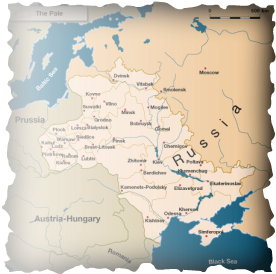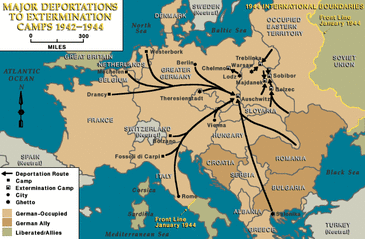The Holocaust
Where was the holocaust and where did it spread?
The war was in Germany, Poland and it spread all over Europe and surrounded states. It was also spread to many countries like USSR, Hungary, Romania, Germany and Austria, the Baltic countries, and many others. However, Germany was bent on conquering all of Europe and therefor invaded almost every country in Europe.Italy first attacked Abyssinia in 1935 in order to obtain a more
territory. Germany and Italy had gained control of most of Europe and
parts of North Africa. They were advancing into colonies of England and
threatening to take control of the Suez Canal.
In the schema of historical materialism , communism is the idea of a free society with no division or alienation, where mankind is free from oppression and scarcity.The United Nations and many countries around the world are today commemorating International Holocaust Remembrance Day,
on the anniversary of the 1945 liberation of the Auschwitz death camps.
Observing the day unites participants both in mourning and in embracing
utopian peace. "Never again" is proclaimed across Europe and around the
world. But is it really a shared message? The truth is that deep
conflicts and fierce rivalries persist between countries that applaud
themselves for spreading the lessons of the Holocaust.
Political divisions lurk around the competing rhetorics of grief and harmony. Of all countries around the globe, European nations are most eager to spread the message – their message – of the Holocaust. Seventy years ago, Germany was on the cusp of uniting the European continent by making all its nations complicit in murdering their Jews. Today, Europe eagerly works toward unification through remembrance of their complicity in that genocidal terror.
To be sure, honouring the victims of the Nazi era is the motive behind Holocaust commemoration in most European countries. But the goal of these initiatives is not only to reflect on Europe's dark past. What matters in Europe even more is to build a future and to boast about a future that has absorbed the lessons of the Holocaust – a future free of genocide, racism and discrimination, and imbued with ideals of peace, tolerance and utopian harmony. Unfortunately, European harmony may be desirable but it is not so easily attained. And not only because it is rooted in genocide. Beneath the harmonious rhetoric of tolerance and inclusion, Europe smoulders with conflicts over exclusion and power struggles over how to establish a world without hatred.
While the United Nations has joined in recognising an International Holocaust Remembrance Day, in truth Europe is the main advocate for 27 January as a unifying day of memory. Both Israel and the United States (as well as Canada) prefer to honour the April anniversary of the Warsaw Ghetto uprising.
The UK, Germany and Sweden introduced 27 January for Holocaust commemoration in 2000 following debates, initiatives and worries that were less about Europe's past and its Jewish victims as much as they were about Europe's present and future – both devoid of Jewish traditions and culture. After the collapse of communism and the fall of the Berlin Wall, the political unification of Europe seemed within reach – if only the continent wasn't so deeply divided. Economic, social and cultural gaps separating east and west were the most recognisable barriers. National identities and national memories still loomed large and blocked the emergence of a supranational European consciousness. The vision of a unified Europe could not be achieved without first fostering a common European memory about the continent's recent past. That, at least, was what politicians, intellectuals and pedagogues insisted when they agreed to base European historical identity on the liberation of Auschwitz. Collective identity demands a common vision for the future as well as a shared past. The Holocaust granted both. And the shocking experience of recent genocidal wars in the former Yugoslavia – right on the doorstep of countries that had felt safe from mass violence – further popularised the rhetoric of "Never again".
That the Holocaust is used, abused, trivialised and exploited for commercial and political benefit is often bemoaned (especially by Europeans) when it comes to Israeli policies against Palestinians or Jewish-American identity politics. But European post-communist appropriation of the Holocaust is different. Taking their cue from Germany, which continues to honestly face its past as perpetrator nation, other European countries have owned up to their collaboration with the Nazis (Lithuania is a notable exception). Indeed, European memorial politics is rich with spectacular self-criticism, presented in ritualised apologies that don't leave much space for the suffering of victims – or their children and grandchildren.
Proud, even smug, from having learned the lessons of its racist and genocidal past, Europe exploits the Holocaust to spread the message of tolerance and peace worldwide. A grand cosmopolitan vision, with Europe as the trendsetter, is pursued through remembrance of the Holocaust in museums, schools and official rituals.
The message of tolerance and peace is not only addressed to Europe but also to those countries that, according to the European view, haven't adequately learned the lessons of the Holocaust – namely the United States, still too often engaged in war, and especially Israel. Europe, of course, has learned the lessons of the Holocaust best. That is the message of Auschwitz remembrance. Has it really done so? In truth, the "other" is far away from the "us" of European cosmopolitanism. Jews are welcome in many (though not all) parts of Europe, but Jewish cultures – the European "other" of the past – no longer exist and Jewish traditions are no longer known in cosmopolitan Europe. Muslim cultures, the new European "other", are even less welcome and ousted as soon as they become too different.
The liberation of Auschwitz is worthy of International remembrance. The problem is we haven't yet determined what lesson we have learned altogether.
Political divisions lurk around the competing rhetorics of grief and harmony. Of all countries around the globe, European nations are most eager to spread the message – their message – of the Holocaust. Seventy years ago, Germany was on the cusp of uniting the European continent by making all its nations complicit in murdering their Jews. Today, Europe eagerly works toward unification through remembrance of their complicity in that genocidal terror.
To be sure, honouring the victims of the Nazi era is the motive behind Holocaust commemoration in most European countries. But the goal of these initiatives is not only to reflect on Europe's dark past. What matters in Europe even more is to build a future and to boast about a future that has absorbed the lessons of the Holocaust – a future free of genocide, racism and discrimination, and imbued with ideals of peace, tolerance and utopian harmony. Unfortunately, European harmony may be desirable but it is not so easily attained. And not only because it is rooted in genocide. Beneath the harmonious rhetoric of tolerance and inclusion, Europe smoulders with conflicts over exclusion and power struggles over how to establish a world without hatred.
While the United Nations has joined in recognising an International Holocaust Remembrance Day, in truth Europe is the main advocate for 27 January as a unifying day of memory. Both Israel and the United States (as well as Canada) prefer to honour the April anniversary of the Warsaw Ghetto uprising.
The UK, Germany and Sweden introduced 27 January for Holocaust commemoration in 2000 following debates, initiatives and worries that were less about Europe's past and its Jewish victims as much as they were about Europe's present and future – both devoid of Jewish traditions and culture. After the collapse of communism and the fall of the Berlin Wall, the political unification of Europe seemed within reach – if only the continent wasn't so deeply divided. Economic, social and cultural gaps separating east and west were the most recognisable barriers. National identities and national memories still loomed large and blocked the emergence of a supranational European consciousness. The vision of a unified Europe could not be achieved without first fostering a common European memory about the continent's recent past. That, at least, was what politicians, intellectuals and pedagogues insisted when they agreed to base European historical identity on the liberation of Auschwitz. Collective identity demands a common vision for the future as well as a shared past. The Holocaust granted both. And the shocking experience of recent genocidal wars in the former Yugoslavia – right on the doorstep of countries that had felt safe from mass violence – further popularised the rhetoric of "Never again".
That the Holocaust is used, abused, trivialised and exploited for commercial and political benefit is often bemoaned (especially by Europeans) when it comes to Israeli policies against Palestinians or Jewish-American identity politics. But European post-communist appropriation of the Holocaust is different. Taking their cue from Germany, which continues to honestly face its past as perpetrator nation, other European countries have owned up to their collaboration with the Nazis (Lithuania is a notable exception). Indeed, European memorial politics is rich with spectacular self-criticism, presented in ritualised apologies that don't leave much space for the suffering of victims – or their children and grandchildren.
Proud, even smug, from having learned the lessons of its racist and genocidal past, Europe exploits the Holocaust to spread the message of tolerance and peace worldwide. A grand cosmopolitan vision, with Europe as the trendsetter, is pursued through remembrance of the Holocaust in museums, schools and official rituals.
The message of tolerance and peace is not only addressed to Europe but also to those countries that, according to the European view, haven't adequately learned the lessons of the Holocaust – namely the United States, still too often engaged in war, and especially Israel. Europe, of course, has learned the lessons of the Holocaust best. That is the message of Auschwitz remembrance. Has it really done so? In truth, the "other" is far away from the "us" of European cosmopolitanism. Jews are welcome in many (though not all) parts of Europe, but Jewish cultures – the European "other" of the past – no longer exist and Jewish traditions are no longer known in cosmopolitan Europe. Muslim cultures, the new European "other", are even less welcome and ousted as soon as they become too different.
The liberation of Auschwitz is worthy of International remembrance. The problem is we haven't yet determined what lesson we have learned altogether.


